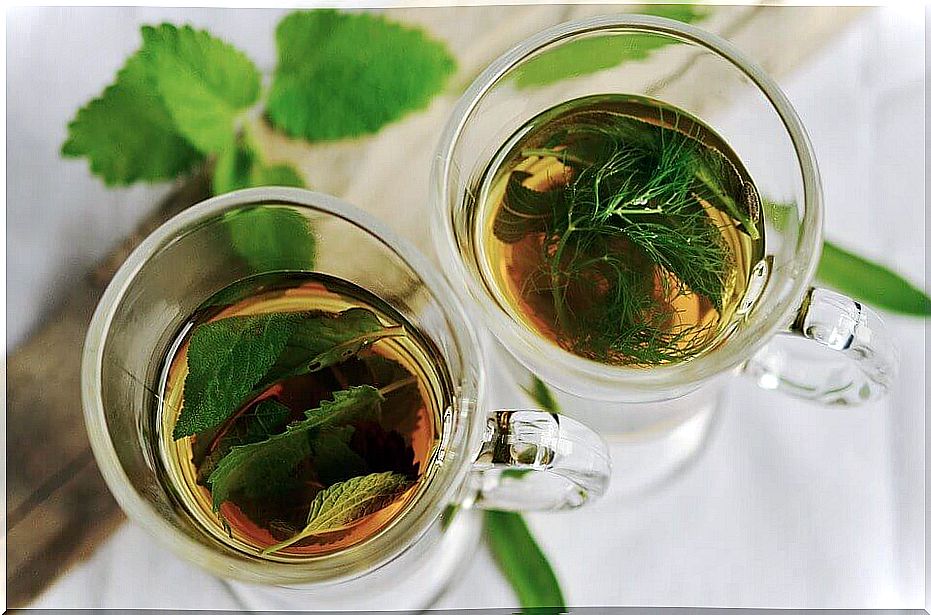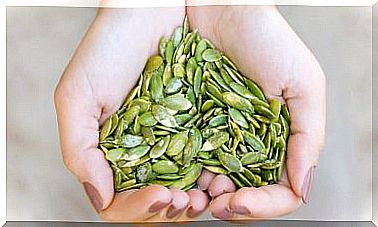Fennel Tea Recipe To Reduce Inflammation Of The Belly
Although it has many health benefits, it is important not to overdo it so as not to suffer adverse effects. Also, it is not recommended to apply it to the skin because it can be irritating.
Do you know the properties of fennel tea to reduce inflammation of the belly? This is the part of our body that tends to swell the most, for many reasons: a heavy diet, food intolerances, fluid retention or digestive problems, among others.
It is true that to achieve a flat and deflated stomach it is necessary to have good eating habits, exercise and, in general, lead a healthy life. However, we can also take into account some aids that can be useful to achieve better results and reduce inflammation of the belly quickly.
Fennel is one of those herbs that works as a support to reduce inflammation of the belly and improve digestive health. This plant is considered an ideal supplement to lose weight, as well as being useful for having a good digestion and a better gastric and intestinal metabolism.
What are the benefits of fennel tea?
Fennel is a plant very similar to celery, but with a flavor and aroma similar to that of anise. The plant can grow up to 2 meters in height and all its parts are edible.
Currently, fennel is part of many recipes of Mediterranean cuisine, as its benefits make it perfect for salads or stews. Its seeds are used as a spice, precisely because of its aroma similar to that of anise.
In addition to being a great support to reduce inflammation of the belly, fennel also provides other important health benefits. Next, we highlight the main benefits of fennel tea :
1. It is anti-inflammatory
Because of its anti-inflammatory properties, as this study on fennel in pharmaceutical sciences points out, fennel tea helps to treat a swollen belly and relax the muscles of the digestive organs. Likewise, this plant has purifying and diuretic qualities that help improve liver function and metabolism.
2. Its composition

It is especially characterized by its high content of phytonutrients and antioxidants, which provide great health benefits. Fennel is also high in calcium, iron, manganese, magnesium, potassium, vitamin C, and B3.
3. Reduces appetite and provides vitality
One of its most prominent benefits is said to be its ability to reduce appetite. It also helps to control anxiety. Historically, it was used by monks in times of fasting. And, next to it, fennel works as an energizer, capable of reducing sleep and improving concentration.
4. Other properties
Fennel can be used for many other problems and ailments. Among them:
- It has been used throughout history as a regulator of menstruation and as a treatment for menstrual cramps, as it contains a phytoestrogen that acts as a natural hormone in women, according to data published in BioMed Research International ,
- It is said to have expectorant qualities, which helps clear the airways in cases of congestion.
- It’s also great for vision and upset stomachs.
- Regular consumption of fennel tea helps control blood pressure and prevents high blood pressure.
- It is rich in antioxidants, capable of fighting free radicals to prevent diseases and premature aging.
Fennel tea for a flat stomach
This fennel tea is great for reducing and preventing belly bloating. Its properties promote digestion, help prevent gas and fight bloating.
Ingredients
- 2 cups of water
- 1 teaspoon of fennel seeds (5 g)
- 1 teaspoon of coriander seeds (5 g)
Preparation
- Put the water and seeds in a pot over medium heat and cover with a lid.
- Bring to a boil and remove from heat immediately.
- Let it rest for 15 minutes, strain it and consume the liquid.
Ideally, drink up to three cups of this tea a day. Leftover liquid can be stored in the refrigerator for up to two days. At the time of consuming it you can heat it.
Possible side effects of fennel
Fennel has great properties, but you have to be cautious. Excessive consumption can be harmful to health. It is important to consume only the recommended daily dose to avoid suffering side effects.
If it is consumed more than recommended, effects that can appear such as hallucinations, muscle spasms and alterations of the nervous system. And this plant should not be applied directly to the skin, as it can cause irritation. For this reason, we always recommend, in the first instance, to go to a health professional to consult before making any change in our lifestyle.
On the other hand, although some cultures claim that this plant is good for breastfeeding, there is still no scientific evidence to support it. Therefore, its consumption should be avoided during pregnancy or lactation.









